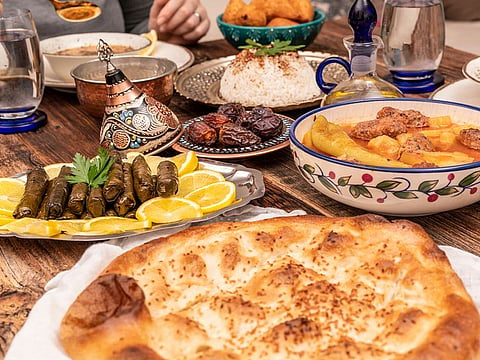Coptic Christmas: Foods and traditions of an Orthodox celebration
As a new year begins, it’s time for Coptic Christmas, celebrated on January 7

First things first why is Christmas celebrated on January 7 in certain countries including Russia, Serbia, Ukraine, Georgia, Belarus, Kazakhstan, Macedonia, Moldova, Montenegro, Ethiopia and Egypt?
The reason is the Orthodox or the second-largest Christian church’s decision to adhere to the 2,000-year-old Julian calendar. It’s a solar calendar that Julius Caesar had adopted after consulting an Egyptian astronomer Sosigenes. However, there arose an issue as Sosigenes’ calculation was apparently off by about 11 minutes causing challenges in observance of holidays by Christians. As a solution, the Gregorian calendar was introduced in 1582 that’s followed by Christians in most parts of the world. Thus, there is a 13-day gap between Christmas celebrated by most Christians on December 25 and January 7 by Orthodox Christians.
Unique traditions and rituals
Orthodox Christmas falls on the fourth month of the Coptic calendar that corresponds with the Julian calendar.
“We call it the Kiahk month falling between December 10 and January 7 as per the Coptic calendar. This month is all about preparing for Christmas … celebrating the birth of Jesus. It’s a month full of prayers, hymns and daily visits to the church. On Christmas eve (January 6) we go to the church and start praying from 6pm onwards that culminates with the midnight mass at 12am,” explained Egypt-based Maria Zaki. Orthodox Christmas is unlike how Christmas is celebrated on December 25. Even the hymns for Orthodox Christmas are different, almost entirely vocal without the use of instruments except the pharaonic daf and trianto.
For UAE-based Serbian expat Milica Vukelic, too, Christmas is marked by a set of unique traditions. In Serbia non-seated liturgies at church and burning badnjak or tree branches are central to Christmas celebrations. The badnjak ritual is supposed to represent the scene where shepherds brought a tree to start a fire and heat the cave in which Jesus was born.
“On Christmas eve, especially in Serbian villages, men go to the forest to bring log/branches of a young oak tree that we call badnjak. It’s brought in front of the home and burnt in the fireplace as a belief to bless the house. In cities since space is limited, we used to buy small branches of badnjak from shops, take it to the church where it’s burnt after the Christmas eve mass. My father would bring a part of badnjak back home before Christmas eve dinner,” Vukelic recollected.
Fasting and feasting
Fasting before feasting is another unique tradition among Orthodox Christians. “Whenever there is a feast, we have to fast even if it’s for a day,” Zaki concurred. “Before festivals like Christmas and Easter, we fast for 43 and 55 days, respectively, abstaining from meat, egg, dairy products and more. Although the church is flexible around how we fast, some people who are very spiritual don’t eat anything from midnight until 3 to 5pm the next day.”
While the fasting period is similar in Serbia, for many families like Vukelic’s it is a matter of choice. “Even if we don’t fast for the entire period, the day before Christmas we do. During the fasting period we consume more nutritious food comprising fruits and vegetables as opposed to fasting altogether. We also abstain from meat, egg and dairy products.” The fasting period is followed by feasting. “On Christmas Day we have a traditional spread consisting of mezze, sarma (pickled cabbage stuffed with meat), kidney beans, cheese pie, ajvar (peeled, minced paprika cooked in oil) and proja (cornflour bread). My grandmother often recollects how during World War II, they could only afford to eat proja so in that sense it’s a super traditional Serbian food and best had with sarma.”
Here is a recipe to making Serbian proja.
“Our festive dinner starts after the Christmas eve mass,” Zaki added. “Usually, mothers prepare for the festive dinner from the morning on January 6. Since people fast for more than a month, the Christmas eve dinner tends to be light and easy to digest. It mainly consists of fatta (roasted bread, rice and meat with soup), boiled eggs and cheese. Christmas Day food is more festive including roast chicken and macaroni in bechamel sauce. While the type of meat might vary, Christmas food is usually the same across Egypt for all Orthodox Christians.”
Here is a recipe to making fatta.
When asked if there’s any salad, Zaki laughed and said, “Not on Christmas day because by then we are tired of having greens.” While elaborate desserts are not made for Christmas, kahk or traditional Egyptian biscuits are always served.
An integral part of Christmas celebrations is the family getting together. While Christmas eve dinner is had with immediate family, Christmas Day lunch involves extended family and friends, both Zaki and Vukelic shared.
“In our family, my late mother would prepare the dinner table and then as my father entered home with badnjak after the midnight mass, we would throw some nuts, corn and wheat on him welcoming him like Santa. Then we would go around the dinner table three times chanting prayers. My mother would then throw walnuts around four corners of the kitchen keeping it for the whole year as a sign of protection. As we sat down for dinner, she would also sprinkle the floor with some corn, wheat and walnuts which stayed for three days and then we started dinner. After father entered home no one was allowed in until Christmas Day morning,” Vukelic reminisced.
“On Christmas Day morning we are visited by our polozajnik, usually a small child from the family who visits home as harbinger of happiness and blessings. The child too burns a small branch of badnjak and chants blessings after which we serve him breakfast and give some gifts. After this we start celebrating Christmas with family and friends. For dinner my mother used to bake bread and stuff some with small things like coins and wheat. On breaking the bread whatever we found indicated how our year would go. It’s more of a fun than a serious tradition,” she added.
Meanwhile, Christmas Day for Zaki is always about gathering in the home of the eldest family member, either at her father’s home or at her husband’s aunt’s home. “We have lunch together or sometimes even snacks comprising milk/tea/coffee with kahk.”
Celebrations galore
Beyond rituals and food, Christmas celebrations include buying and wearing new clothes, gift exchange, visiting family, friends and even spending time with the less fortunate.
“As children we used to be excited about wearing new clothes on Christmas and wait for Eidiyah, which is a token of money given by elders to youngers. Some people also write special messages on smaller notes like EGP1 or 5 to be kept as remembrance. When I was young, I would spend my Eidiyah to buy candies and all things that were largely forbidden throughout the year. We also used to and still decorate the Christmas tree. While growing up, on Christmas Day we used to be excited on seeing our gifts under the tree, but we knew it was from my father,” Zaki shared. Her three children however expect gifts from Santa Claus or Baba Noel as popularly known in Egypt. Interestingly, Santa used to and still visits churches in Egypt on Christmas Day morning to distribute gifts to children, which is one of Zaki’s fond memories.
We even buy presents for New Year’s Eve and not for Christmas. And Santa also visits on New Year’s Eve

A unique celebration in Serbia is to bring out and decorate the Christmas tree in the new year. “We even buy presents for New Year’s Eve and not for Christmas. And Santa also visits on New Year’s Eve,” Vukelic laughed. Although not related to Christmas, another interesting tradition in Serbia is that every family has a guardian saint. “Ours is Saint George and we celebrate St. George’s Day with prayers and feast. If it falls on Wednesday or Friday, we follow fasting rituals not serving meat on the day even if it’s feast.”
Pointing out how celebrations have changed since the pandemic, Zaki said, “Churches were closed last year, and prayers were conducted virtually. While we had Christmas Day meals at our respective homes, we got on video calls with family members to have some semblance of gathering. Even gifts were given to the children but from a distance.”
For Vukelic who has celebrated Christmas Day in the UAE for the past seven years, it’s more like a normal day. “But I try to have dinner with friends that day,” she concluded.
Sign up for the Daily Briefing
Get the latest news and updates straight to your inbox




